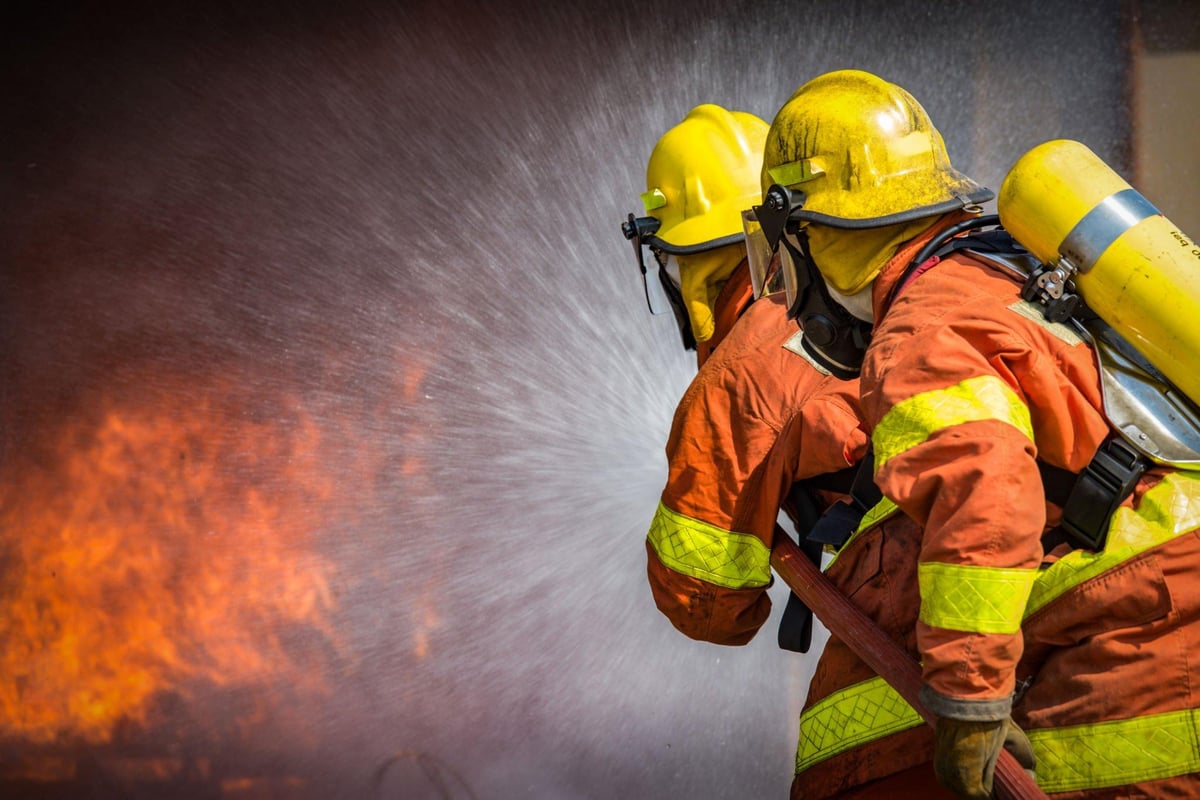Fire Science classes near me in Columbus
In the Columbus metro area, the average cost of a class is $18000 and the average class length is approximately 37 weeks long
Trade and industry classes near
Columbus, OH 43215Online classes
Financial aid

Liberty University Online
BS: Civil Engineering
- Online, completion in as little as 48 months.
- Option to transfer credits for up to 75% of the entire degree.

Southern New Hampshire University
BS Operations Management with concentration in Logistics and Transportation
- Complete your degree at your own pace
- 24/7 online accessibility

Southern New Hampshire University
MS Management with concentration in Construction Management
- Learn to manage essential project teams
- Program accredited by ACBSP
Fire Science classes near me in Columbus
Are you interested in pursuing a career in firefighting? If you live in Columbus, Ohio, you're in luck! There are several fire science classes available in the area that can help you get started on your path to becoming a firefighter. In this blog post, we will explore what fire science is, the training requirements for firefighters, what to look for in a fire science class, what to expect from the day-to-day class, the certification process, how to find related jobs, and other classes you can take after becoming a fire science professional.

Introduction
Fire science is the study of fire behavior, prevention, and suppression. It involves learning about the science behind fires, as well as the techniques and strategies used to extinguish them. Fire science classes provide students with the knowledge and skills needed to become firefighters or pursue other careers in fire safety and prevention.
What is Fire Science?
Fire science is a multidisciplinary field that combines elements of chemistry, physics, engineering, and psychology to understand how fires start, spread, and can be controlled. It encompasses the study of fire behavior, fire prevention, fire investigation, and fire suppression techniques.
Training Requirements for Firefighters
Becoming a firefighter requires a combination of education and physical fitness training. The specific requirements may vary depending on the fire department and state regulations. However, here are some general training requirements for firefighters:
- High school diploma or GED equivalent
- Completion of a fire science program or academy
- Physical fitness test and medical examination
- Possession of a valid driver's license
- CPR and first aid certification
What to Look for in a Fire Science Class
When searching for fire science classes in Columbus, it's important to consider the following factors to ensure you find the best program for your needs:
- Accreditation: Look for programs that are accredited by recognized organizations or governing bodies in the field of fire science. This ensures that the program meets certain standards of quality and relevance.
- Curriculum: Review the curriculum of the program to ensure it covers all the essential topics in fire science, such as fire behavior, prevention, and suppression techniques.
- Hands-on Training: Practical experience is crucial in fire science education. Look for programs that offer hands-on training opportunities, such as live fire exercises or simulations.
- Experienced Instructors: The expertise and experience of the instructors can greatly impact your learning experience. Look for programs that have knowledgeable instructors with real-world experience in the fire service.
- Facilities and Resources: Check if the program has state-of-the-art facilities and resources that will enhance your learning experience. This may include training props, equipment, and access to modern firefighting technology.
What to Expect from the Day-to-Day Class
Fire science classes typically involve a combination of classroom lectures, hands-on training, and practical exercises. Here's what you can expect from the day-to-day class:
- Classroom Lectures: You will attend lectures where you will learn about fire behavior, fire prevention strategies, firefighting techniques, and relevant laws and regulations.
- Hands-on Training: You will participate in hands-on training sessions where you will learn how to operate firefighting equipment, perform search and rescue operations, and extinguish different types of fires.
- Physical Fitness Training: Firefighters need to be physically fit to perform their duties effectively. You can expect to engage in physical fitness training activities, such as running, strength training, and agility exercises.
- Teamwork and Collaboration: Firefighting is a team effort, so you will have opportunities to work collaboratively with your classmates on various exercises and simulations.
The Certification Process
After completing a fire science program, you will need to go through the certification process to become a firefighter. The requirements may vary depending on the state and fire department, but generally, the process involves the following steps:
- Written Exam: You will need to pass a written exam that tests your knowledge of fire science principles, firefighting techniques, and relevant laws and regulations.
- Physical Fitness Test: Firefighters need to meet certain physical fitness standards. You will be required to pass a physical fitness test that assesses your strength, endurance, and agility.
- Medical Examination: A medical examination is conducted to ensure that you are physically fit to perform the duties of a firefighter and free from any medical conditions that may hinder your performance.
- Background Check: A thorough background check, including criminal history and driving record, is conducted to ensure that you meet the requirements to become a firefighter.
- Interview: You may be required to participate in an interview to assess your communication skills, problem-solving abilities, and suitability for the role of a firefighter.
How to Find Related Jobs
Once you have completed your fire science training and obtained the necessary certifications, you can start looking for firefighting job opportunities. Here are some ways to find related jobs:
- Fire Department Websites: Visit the websites of local fire departments in Columbus or surrounding areas to search for job openings and application instructions.
- Job Search Engines: Utilize job search engines like Indeed, Monster, or Dreambound to search for firefighting jobs in your area.
- Networking: Reach out to professionals in the fire service industry, attend job fairs, and join professional organizations to network and learn about job opportunities.
- Volunteer: Consider volunteering at a local fire department or participating in community service events related to fire safety. This can help you gain experience, make connections, and increase your chances of finding a job.
Other Classes After Becoming a Fire Science Professional
After becoming a fire science professional, there are several other classes you can take to expand your knowledge and enhance your career prospects. Some of these classes include:
- Emergency Medical Technician (EMT) Training: Firefighters often provide emergency medical services. By obtaining EMT certification, you can enhance your skills in providing medical assistance during emergencies.
- Hazardous Materials (HAZMAT) Training: HAZMAT training prepares firefighters to handle and mitigate hazardous material incidents, such as chemical spills or gas leaks.
- Incident Command System (ICS) Training: ICS training teaches firefighters how to manage emergency incidents effectively and coordinate resources and personnel.
- Technical Rescue Training: Technical rescue training focuses on specialized rescue techniques, such as high-angle rope rescue, confined space rescue, and water rescue.
Final Thoughts
If you're interested in a career in firefighting, pursuing fire science classes in Columbus can be a great first step. These classes will provide you with the knowledge and skills needed to become a firefighter or pursue other careers in fire safety and prevention. Remember to consider factors like accreditation, curriculum, hands-on training, and experienced instructors when choosing a fire science program. Once you've completed your training and obtained the necessary certifications, you can start searching for firefighting job opportunities. Additionally, consider taking other classes, such as EMT training or HAZMAT training, to expand your skillset and increase your career options.
Dreambound has you covered with a series of detailed guides, each designed for a different city. And if you're elsewhere or considering a move, we've got more guides that might fit your needs.
- How to Become a Firefighter in Arizona
- How to Become a Firefighter in Maine
- How to Become a Firefighter in Michigan
- How to Become a Firefighter in Ohio
- How to Become a Firefighter in Wyoming
Thinking about making a career switch? Dreambound has written thorough guides to help you understand different options available to you.
FAQ
What is Dreambound?
Dreambound's platform has the largest number of options for students to find career & technical education. While we can't guarantee any career outcomes, our mission is to provide you with the information you need to find a program that helps you start your new career journey.
What programs do you offer?
Dreambound has over 70 programs across healthcare, technology, business, and industrial trades. This includes programs such as Medical Billing, Cybersecurity, and welding.
Do you offer financial aid?
Some of our schools offer financial aid for those who qualify. Many others offer payment plans, where you can pay the cost of class over time.
Is it possible to do online classes?
Yes, Dreambound offers many online programs. On Dreambound's search, you can filter by online, in-person, and hybrid (part online, part in-person).
